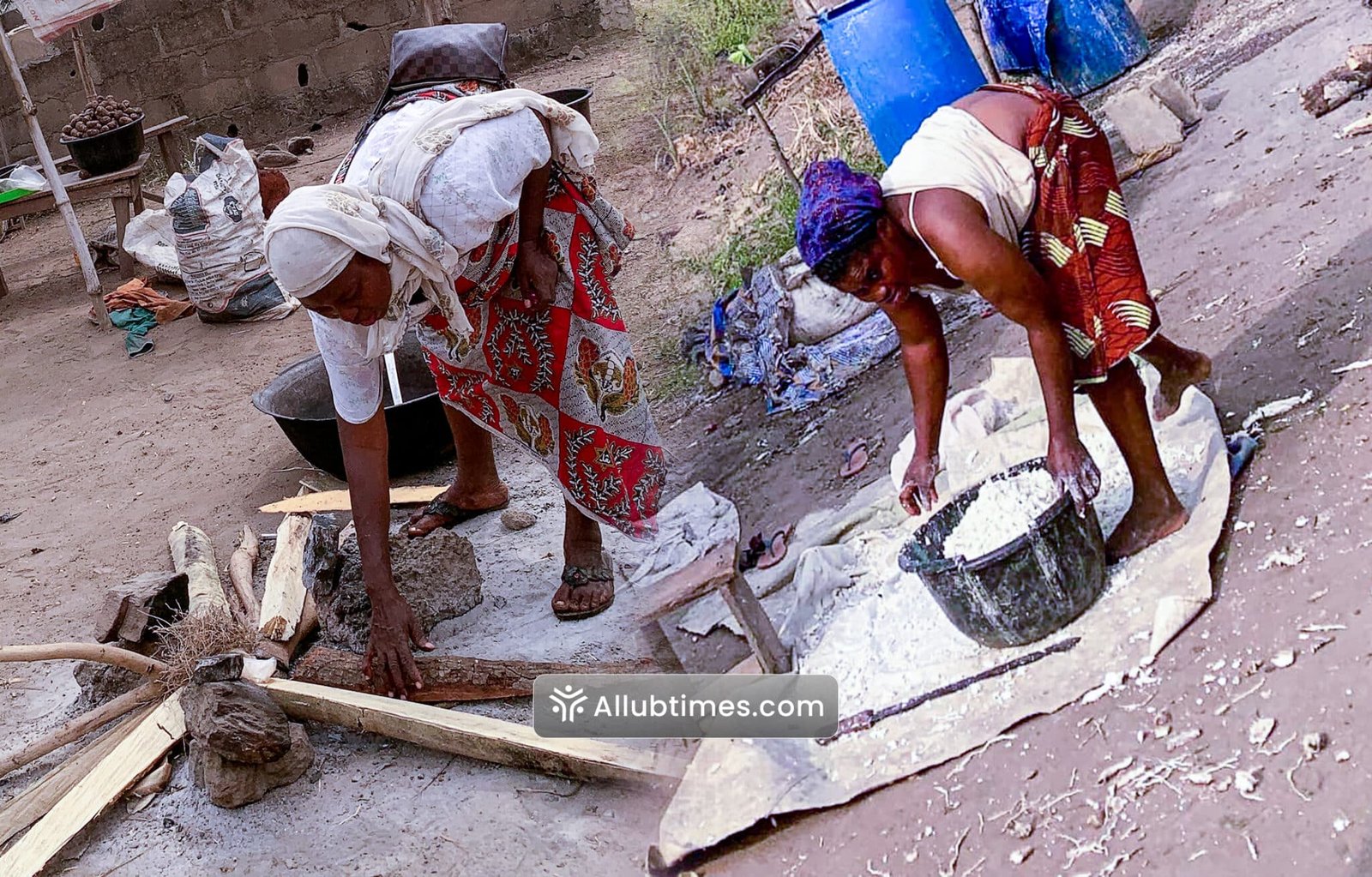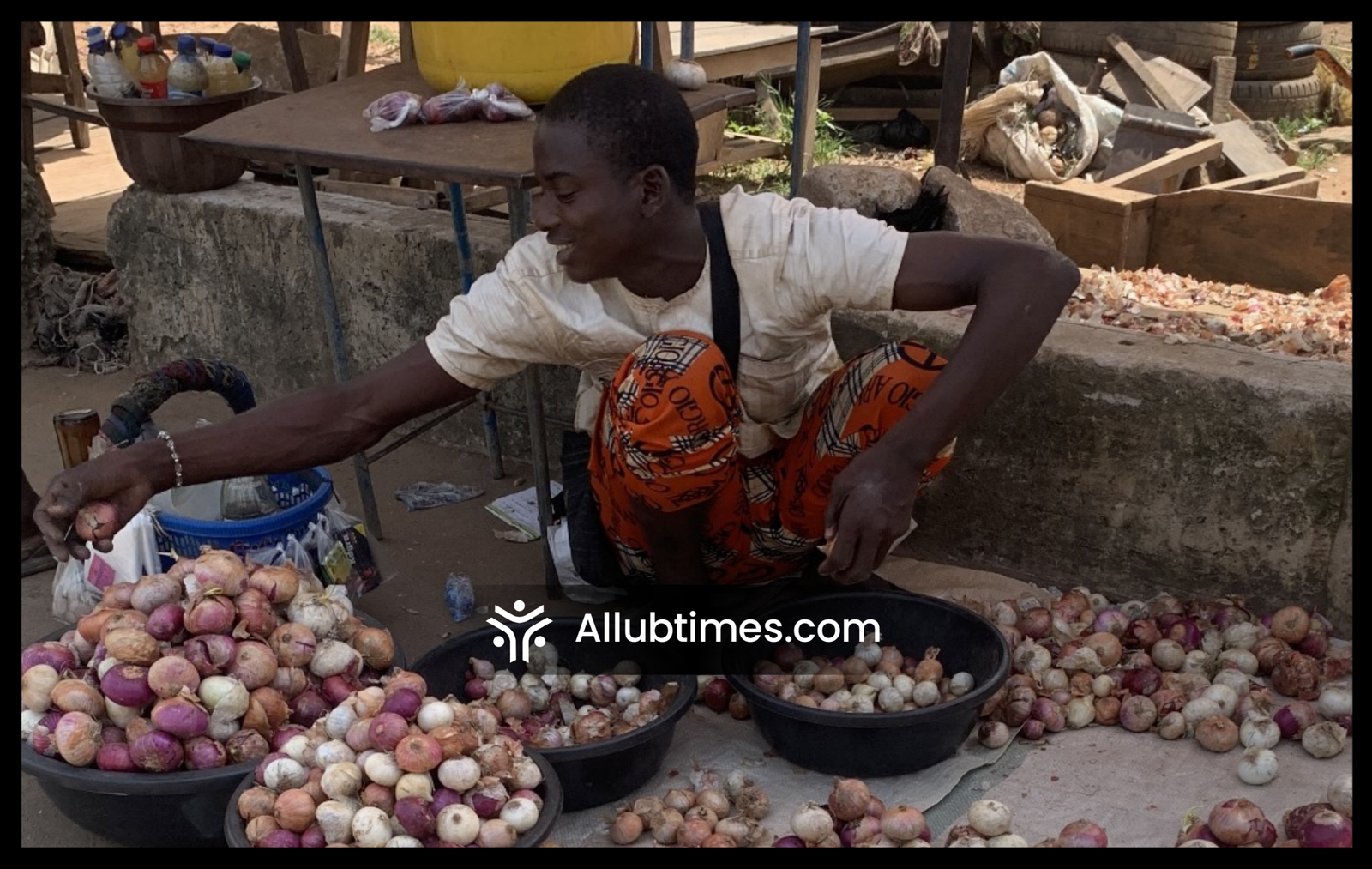In the rural and forgotten corners of Ogere, Ogun State, where dusty roads wind through clusters of dilapidated homes, the dawn breaks quietly, casting a glow over a landscape ravaged by poverty and neglect. Here, Ajara Fasasi, a widow and mother of three, is surrounded by the remnants of a life once full of promise.
Ajara sells iced fish to make ends meet. She starts her day by attending to customers’ orders, picking the best fish, cutting them into perfect rounds, with her hands and knife moving with practiced precision. Yet, behind this act so simple lies a complex story of resilience and desperation.
Ajara faces an unrelenting crisis that threatens to consume everything. Nigeria’s economic crisis has ravaged her livelihood, leaving her on the brink of collapse. For her, this is a far cry from her former life as a pepper grinder.
“I make little from selling fish,” she says. “It’s barely enough to feed my children. But what choice do I have?”
Not long ago, Ajara earned a modest living grinding pepper. But when her grinding machine broke down, the cost of repair proved insurmountable. She sold the machine to buy food for her children and turned to selling fish. “I used to grind pepper for people, but when the machine got spoiled, I sold it, and we used the money to eat,” she said.
Desperate to make more money aside from selling the fish, she turned to working as a cleaner in people’s homes on weekends for a sum of 1,000 naira. The meager earnings barely cover her children’s meals, leaving her with an unbearable choice: sell her last possessions or risk hunger. “I’ve sold my children’s clothes, my own clothes, anything to feed them,” she confesses. “The thought of them going to bed with empty stomachs makes me sad.”.
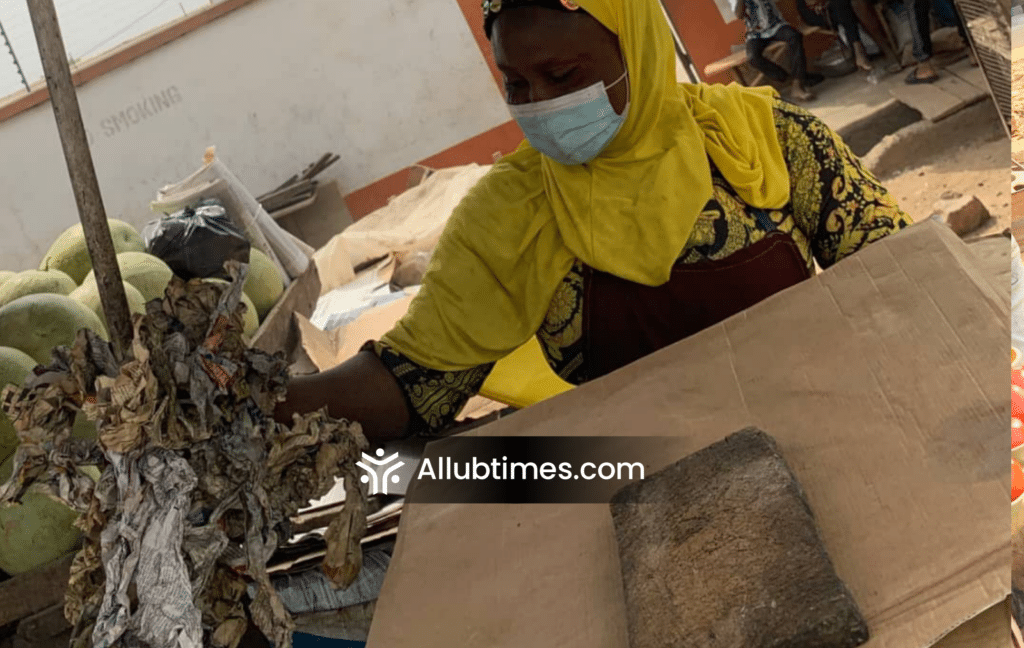
Ajara’s eyes wander as she recalls her husband’s memory. Her voice falters when she speaks of her late husband, who passed away last year. “He was our rock, our provider,” she says. “His absence has left a gaping hole in my life, and now, I’m struggling.” Her husband’s passing left her alone to face life’s crisis. The weight of her responsibilities hangs heavy, as she shoulders the burden of feeding her children and herself.
With each passing day, Ajara’s struggles intensify. “The hunger I face now is worse compared to previous years. We’re surviving on God’s grace,” Ajara says, her voice heavy with burden. “Poverty is real, and we’re living examples of it.”
Ajara’s story is just one of millions in Nigeria, where women bear the brunt of a hunger crisis that has transformed the simplest act of feeding a family into an unrelenting battle. Her case represents that of millions of women in Nigeria who have fallen into the grip of hunger and for whom putting a meal together has become an insurmountable task.
Rising inflation, shrinking agricultural yield, and the effects of a global economic shock have brought Nigeria to its knees. The struggle sharpens like a knife, cutting into the soul of Nigeria’s mothers, the silent architects of family survival.
Hunger Has a Female Face
In Nigeria, hunger wears the face of women. For the women, hunger is more than a personal tragedy—it is a social burden. They are the ones who skip meals, eating last and least, stretching what little food there is to ensure their children survive.
The statistics paint a harrowing picture. About 5.4 million children and 800,000 pregnant and breastfeeding women are threatened with acute malnutrition in Nigeria, while rural women are suffering livelihoods that have been eroded by the hunger crisis.
According to a new food insecurity and malnutrition analysis by the World Food Programme, 33 million Nigerians could face hunger next year. The report reveals that economic hardship, climate crisis, and violence are projected to push 33.1 million Nigerians into food insecurity in 2025.
Nigeria faces dire economic hardship amid record-high inflation. According to the National Bureau of Statistics, headline inflation in Nigeria moved from 32.70% in September 2024 to 33.88% in October, and in the same month, the country’s food inflation rate jumped from 37.8% in September to 39.2%.
But Nigeria’s hunger crisis is more about people than it is about numbers; people losing their dignity.
In the heat of Lagos’ Epe area, Nkechi Joseph clutched her last N500 note as though it could somehow multiply. Around her, the cries of traders hawking in the neighborhood faded into a dull hum. Her four-year-old son, Ishola, clung to her leg, tugged at her faded wrapper, his skeletal frame, and eyes hollow from days of eating nothing but minimum food, a stark reminder of the days they had survived on little food.
Nkechi’s business, making and selling cassava flour, once brought in a meager income. However, rising prices and dwindling demand have reduced her earnings to mere scraps. Nkechi sits, pauses her work, and her eyes scan for a glimmer of hope as she calculates the impossible: how to stretch her meager money to feed her children for another day.
“This cannot feed my children,” she muttered under her breath. Nkechi stared for long, deep in thought, and shook her head. “Everything has now tripled in price. We find it difficult to sell because people don’t have the money to buy. Sometimes, we go a day empty-handed.”
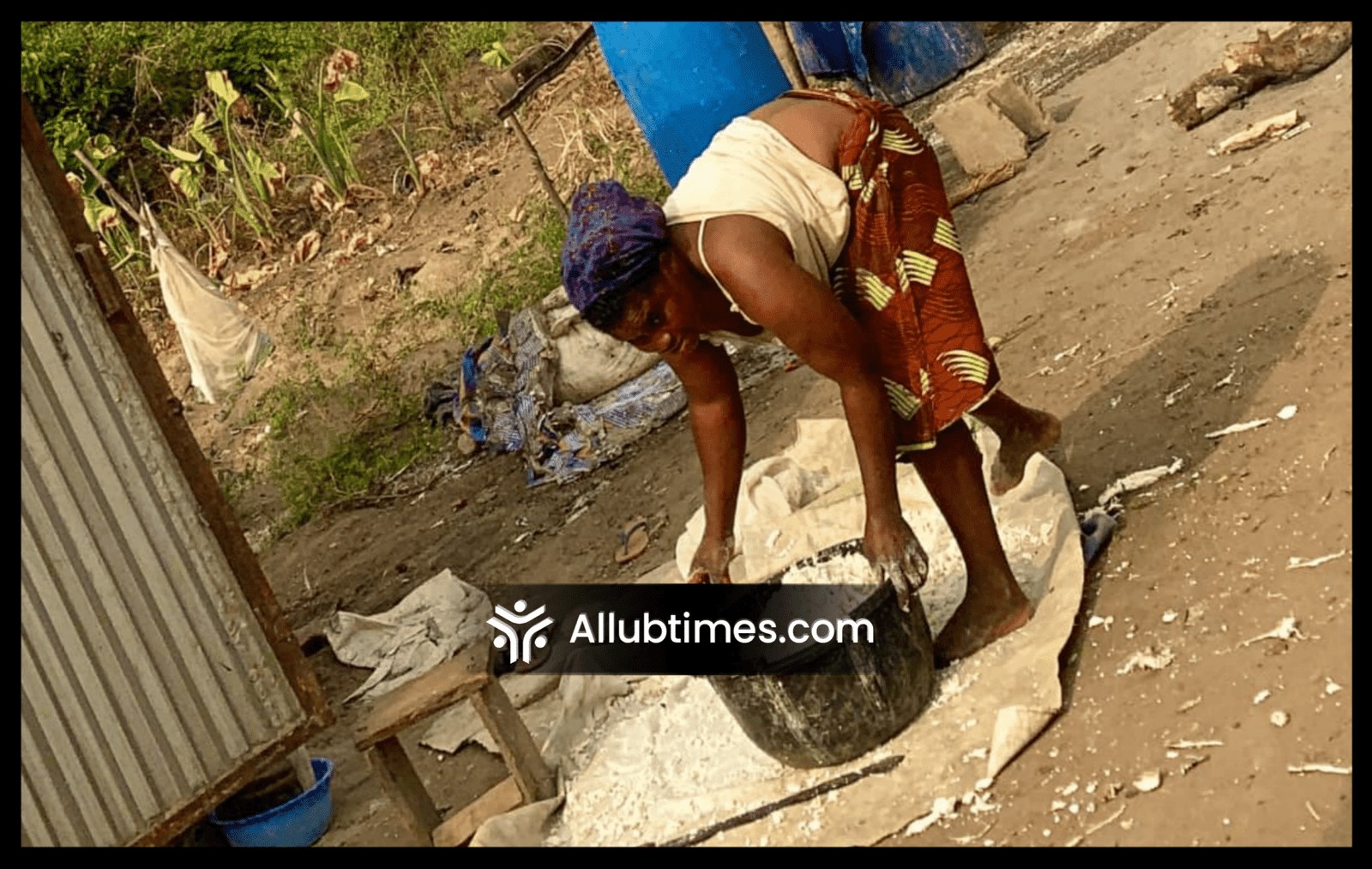
Nkechi’s story is a sad reminder of how Nigeria’s economic crisis is decimating communities. The failure of government policies to stem the tide of poverty has resulted in many families not being able to feed themselves or afford basic needs. “On many days, people come, they ask for prices, and leave,” said Nkechi. “People don’t eat much anymore. Even those who can afford buying are now buying less.”
Festive Season in the Time of Hunger
The festive season approaches, but the crisis takes on a cruel irony. The desperation and despair have wiped away the traditional joys and cheers of Christmas and New Year. Kitchenless kitchens, silent streets of cities and towns, tell their tale of a nation failing to make two ends meet.
As Christmas approaches, the season’s usual joy feels like a cruel joke to families like Nkechi’s. “Christmas is a time of enjoyment, yet to us, it remains just another day to survive,” said Nkechi. “I see people buying rice, chicken, and oil; I can’t recall the last time we ate well.”
Nkechi’s story is not unique. Millions of Nigerians face a harsh reality. The empty kitchens and silent streets tell a story of despair. The idea of a celebratory meal for many families is a distant dream, replaced by the harsh reality of hunger and poverty.
Nkechi’s tale takes a darker turn. Last Christmas, her desperation led to humiliation. Unable to repay a 30,000 naira debt to a neighbor, she was arrested. “I was taken to the police station, my children crying,” Nkechi recalls, the shame still fresh. Her husband, a bus driver, offered no support. “He told the police to take me away. Said it would teach me not to borrow money.”
Nkechi’s husband was absent, leaving her to shoulder the burden alone. His nonchalant attitude towards their struggles is compounded by his infidelity. “He doesn’t care about us,” Nkechi said. “He doesn’t come home, as he sleeps around with women, leaving me to fend for our children.”
Despite her husband’s betrayal, Nkechi’s family rallied around her, determined to help her repay the debt. The family sold off possessions to contribute to the repayment. “We sold my brother’s radio, my fan, and even our old television,” Nkechi said. “It was hard, but we had to do what was necessary.”
For Nkechi and many others, celebrating the festivities feels like just another day of struggle. Survival is a daily battle. Nkechi’s words echoed the desperation of countless others. “But if we cannot eat,” she said, clutching her son close, “then what is there to celebrate?”
Why the Crisis Persists
The roots of Nigeria’s hunger crisis are complex. The current hunger crisis is not accidental. One of the major contributory factors is the impact of climate change. Nigerian agriculture is highly vulnerable to erratic weather; most farmers are smallholders, and climate change has let loose droughts, erratic rains, and floods that have devastated the farmlands and reduced harvests.
According to the Food and Agriculture Organization of the United Nations (FAO), between 1 and 15 October 2024, more than 9.2 million people were affected by floods, and about 4.5 million hectares of land (including 1.6 million hectares of arable land) were submerged.
Analysis shows that about 1.1 million tonnes, enough to feed 13 million people for one year, could be the possible annual estimated production losses due to maize, sorghum, and rice collectively in the flooded areas. In financial terms, the potential cereal crop losses amount to nearly USD 1 billion in economic losses.
Persistent violence also hinders food availability and access. Fertile farmlands in northern Nigeria have turned into desolate areas of fear because of the armed conflicts and insecurity that have forced thousands of farmers to flee their land. Most households cannot afford to buy staples from outside the nation due to the depreciating value of the naira and high inflation, with local food production unable to meet demand.
“The hunger crisis in Nigeria is complex. We need urgent government intervention and investment in climate-resilient agriculture,” said Seun Ajayi, an agricultural economist. “Without it, we will continue to see cycles of food shortages,” Seun told Allub Times.
“It’s about breaking this cycle where we have to make agriculture sustainable, support small-scale farmers, and address the causes that bring food insecurity. If we fail to take action now, we’ll enter into a vicious circle of continuous starvation, poverty, and unrest,” Seun added.
A Fight for Survival
For the children of Nigeria, this hunger crisis leaves scars deeper than empty stomachs. Amid the bleakness, Nigerian mothers show an unyielding spirit. Stories of resilience shine through in despair.
In the Ido area of Ibadan, Basirat’s story stands tall in the unrelenting spirit of Nigerian mothers. A mother of one, she sells Moi Moi (bean cake) to survive, her eyes burning with determination. But beneath her strength lies a heartbreaking reality: the hunger crisis’s devastating impact on her child.
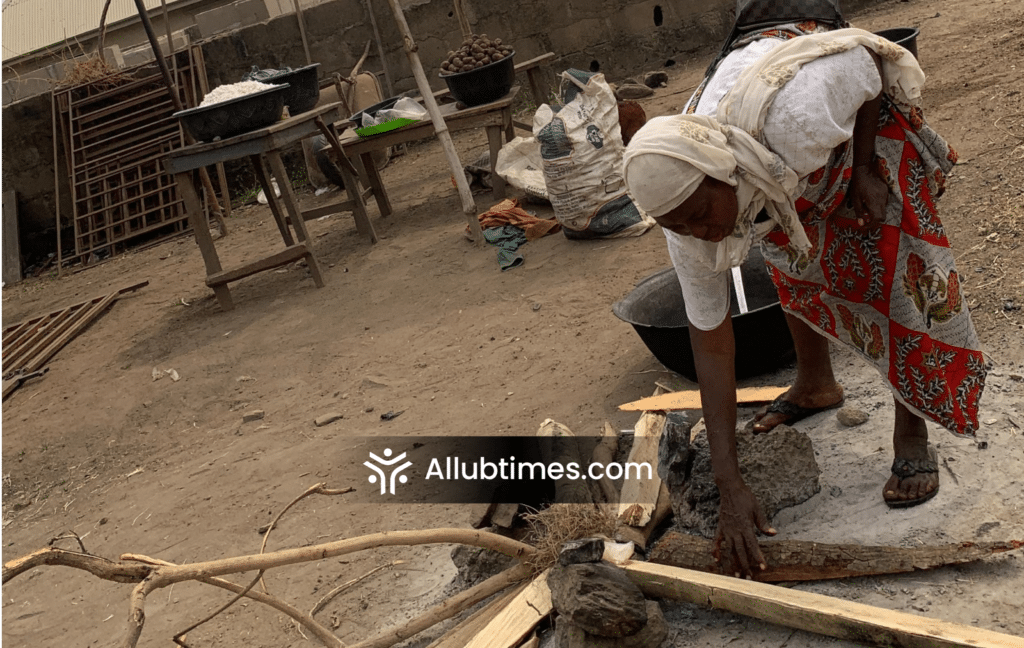
“My 13-year-old son didn’t attend school for weeks because there was nothing to eat at home,” Basirat recounts. The mother couldn’t bear the thought of her child struggling in class, weakened by hunger. “His health comes first. I’d rather my child be healthy,” Basirat says. “But how can I provide for him when there’s nothing to eat? What future does he have if he can’t even eat?” she asked.
Basirat’s decision to prioritize her son’s health over education highlights the impossible choices Nigerian mothers face. The hunger crisis leaves scars that extend far beyond empty stomachs. It erodes hope, destroys dreams, and silences futures. “We need help, and we need it now,” Basirat pleads. “Our children’s futures depend on it.”
Basirat’s story is a replica of the many Nigerian mothers making unimaginable sacrifices for their children. To them, it is not just a simple physical pain; it is an attack on their dreams, dignity, and future.
Thousands of Nigerian women and mothers face similar struggles every day; they are out in this treacherous landscape of hunger, poverty, and desperation as they struggle to preserve the dignity of their children. “This hunger crisis has reached a tipping point,” Basirat says. “We are mothers fighting to give our children a future. We need a helping hand
